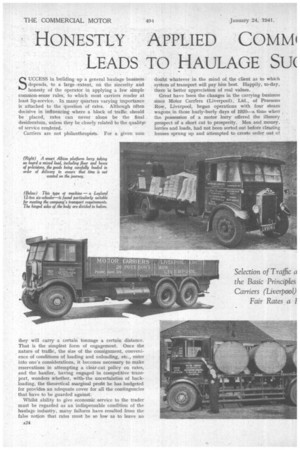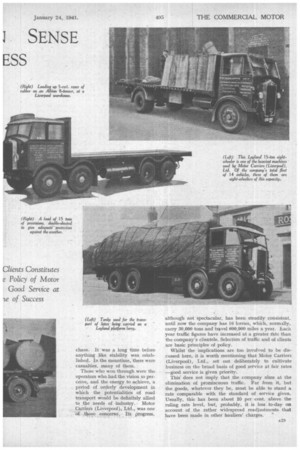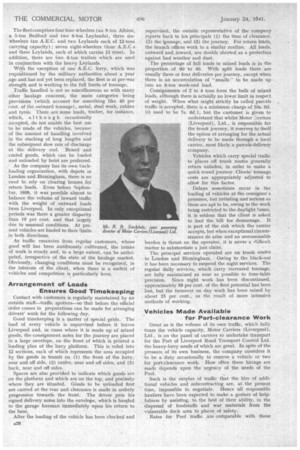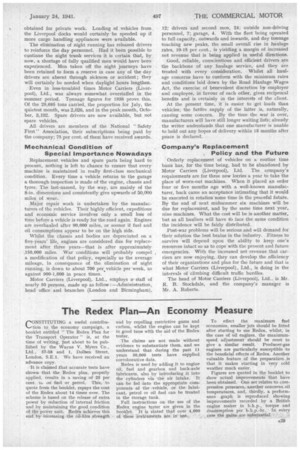HONESTLY APPLIED COMM+ I SENSE
Page 26

Page 27

Page 28

Page 31

If you've noticed an error in this article please click here to report it so we can fix it.
LEADS TO HAULAGE Su(
ESS
SUCCESS in building up a general haulage business depends, to a large ;extent, on the sincerity and honesty of the operator in applying a few simple common-sense rules, to which most carriers render at least lip-service. In many quarters varying importance is attached to the question of rates. Although often decisive in influencing where a block of traffic should be placed, rates can never alone be the final desideratum, unless they be closely related to the quality. of service rendered.
Carriers are not philanthropists. For a given sum they will carry a certain tonnage a certain distance. That is the simplest form of engagement. Once the nature of traffic, the size of the consignment, convenience of conditions of loading and unloading, etc., enter into one's considerations, it becomes necessary to make reservations in attempting a Clear-cut policy on rates, . and the haulier, having engaged in competitive transport, wonders whether, with. the uncertainties of backloading, the theoretical marginal profit he has budgeted for provides an adequate cover for all the contingencies that have to be guarded against.
Whilst ability to give economic service to the trader most be regarded as an indispensable condition of the haulage industry, many failures have resulted from the false notion that rates must be so low as to leave no doubt whatever in the mind of ,the client as to which system of transport will pay him best. Happily, to-day, there is better appreciation of real values.
Great have been the changes in the carrying business since Motor Carriers (Liverpool), Ltd., of Preesons Row, Liverpool, began operations with four steam wagons in those hurly-burly days of 1920 a time when the possession of a motor lorry offered the illusory prospect of a short cut to prosperity. Men and money, lorries and loads, had not been sorted out before clearing houses sprung up and attempted to create order out of chaos. It was a long time before anything like stability was established. In the meantime, there were casualties, many of them.
Those who won through were the operators who had. the vision to perceive, and the energy to achieve, a period of orderly development in which the potentialities of road transport would be definitely allied to the needs of -industry. • Motor Carriers (Liverpool), Ltd., was one of _those concerns. Its progress, although not spectacular, has been steadily consistent, until now the company has 16 lorries, which, normally, carry 30,000 tons and travel600,000 miles a year. Each year traffic figures have increased at a greater rate than the company's clientele, Selection of traffic and. of clients are basic principles of policy.
Whilst the implications are too involved to be discussed here, it is worth mentioning that Motor Carriers (Liverpool), Ltd., set out deliberately to cultivate business on the broad basis of good service at fair rates —good service is given priority.
This' does not imply that the company aims at the elimination of promiscuous traffic. Far from it, but the goods, whatever they be, must be able to stand a rate comparable with the standard of service given. Usually, this has been about 10 perU cent, above the ruling rate level, but, probably, it is less to-day on account of the rather widespread readjustments that have been made in other hauliers' charges. The fleet comprises four four-wheelers (an 8-ton Albion, a 5-ton Bedford and two 8-ton Leylands), three sixwheelers (an A.B.C. and two Leylands each of 12-tons carrying capacity) ; seven eight-wheelers (four A.E.C.s and three Leylands, each of which carries 15 tons). In addition, there are two 6-ton trailers which are used in conjunction with the heavy Leylands.
With the exception of one A.E.C. lorry, which was requisitioned by the military authorities about a year ,ago and has not yet been replaced, the fleet is at pre-war strength and is working to the full limits of tonnage.
Traffic handled is not so miscellaneous as with many other haulage concerns, the main categories being provisions (which account for something like 40 per cent, of the outward tonnage), metal, Steel work, rubber and tyres. There are some loads, timber, for instance, which, although occasionally accepted, do not enable the best use to be made of the vehicles, because of the amount of handling involved in the stacking of long lengths and the subsequent slow rate of discharge at the delivery end. Boxed and crated goods, which can be loaded and unloaded by hoist are preferred.
As the company has its own ;backloading organization, with depots in London and Birmingham, there is no need to rely on clearing houses .for return loads. Even before September, 1939, it was possible almost to balance the volume of inward traffic with the weight of outward loads from Liverpool. In only exceptional periods was there a greater disparity than 10 per cent, and that largely due to seasonal conditions. At present vehicles are loaded to their limits in both directions.
As traffic emanates from regular customers, whose good will has been assiduously cultivated, the intake of work is steady and, to a large extent, can be anticipated, irrespective of the state of the haulage market. Obviously, changing conditions must be recognized, in the interests of the client, when there is a surfeit of vehicles and competition is particularly keen.
Mr. R. B. Stec director of Motor C
Arrangement of Loads Ensures GoodTimekeeping Contact with customers is regularly maintained by an outside staff—traffic spotters—so.that before the official order comes in preparations can be made for arranging drivers' work for the following day.
Good timekeeping is a matter of special pride. The load of every vehicle is supervised before it leaves Liverpool and, in cases where it is made up of mixed goods, the consignment notes for the journey are placed in a large envelope, on the front of which is printed a loading plan of' the lorry platform. This is ruled into 12 sections, each of which represents the area occupied by the goods in transit on (1) the front of the lorry, near and off side, (2) centre, near and off sides, and (3) back, near and off sides.
Spaces are also provided to indicate which goods are on the platform and which are on the top, and preCisely where they are situated. Goods to be unloaded first are carried at the rear and clearance is made in orderly progression towards the front. The driver puts his signed delivery notes into the envelope, which is handed to the garage foreman immediately upon his return to the base.
After the loading of the vehicle has been checked and supervised, the outside representative of the company reports back to his principals (1) the time of clearance, (2) the tpnnage, and (3) the journey. For return loads, the branch offices work to a similar routine. All loads, outward and.inward, are double sheeted as a protection against bad weather and dust.
The percentage of full loads to mixed loads is in the proportion of GO to 40. With split loads there are usually three or four deliveries per journey, except when there is an accumulation of " smalls" to be made up into an 8-ton week-end load.
Consignments of 2 to 4 tons form the bulk of mixed loads, although there is actually no lower limit in respect of weight. When What might strictly he called parcels traffic is accepted, there is a minimum charge of 10s. 6d. (it used to be 7s. 6d.),. but the customer is given to understand that whilst Motor ::arriers (Liverpool), Ltd., is responsible for the trunk journey, it reserves to itself the option of arranging for the actual delivery to be made through a local carrier, most likely a parcels-delivery company.
Vehicles which carry special traffic to places off trunk mutes generally return unladen, in order to make a quick round journey. Clients' tonnage costs are appropriately adjusted to alloy,' for this factor.
Delays sometimes occur in the loading of vehicles at the consignor's premises, but irritating and serious as these are apt to be, owing to the work being restricted to the daylight !lours, it is seldom that the client is asked to foot the bill for demurrage. It is part of the risk which the carrier accepts, but when exceptional circumstances do arise and an unreasonable burden is thrust on the operator, it is never a difficult matter to substantiate a just claim: The principal services operated are on trunk routes to London and Birmingham. Owing to the black-out it has been necessary to suspend the night services. The regular daily services, which carry increased tonnage, are fully maintained as near as possible to time-table precision. Since night work has been discontinued, -approximately 50 per cent, of the .et potential has been lost, but the turnover on day work has been raised by about 25 per cent., as the result of more intensive methods of working.
kdale, joint gowning arriers (Liverpool) Ltd.
Vehicles Made Available for Port-clearance Work
Great as is the volume of its own traffic, which fully -taxes the vehicle capacity, Motor Carriers (Liverpool), Ltd., is on the 'panel of carriers to undertake transport for the Port of Liverpool Road Transport Control Ltd. the heavy-lorry needs of which are great. In spite of the pressure of its own business, the company considers it to be a duty occasionally to reserve a vehitle or two for putt-clearance work. How often these hirings are made depends upon the urgency of the needs of the Pool.
Such is the surplus of traffic thatthe hire of additional vehicles and subcontracting are, at the present time, impossible to negotiate. Hence all responsible hauliers have been expected to make a gesture of helpfulness by assisting, to the best of their ability, in the dispersal of foodstuffs and war materials from the vulnerable dock area to places of safety:
Rates for Pool traffic are comparable with those obtained for private work. Loading of vehicles from , the Liverpool docks would certainly be speeded up if more cargo handling appliances were aVailable.
The elimination of night running has released drivers to reinforce the day personnel. Had it been possible to continue the night trunk services it is certain that, by now, a shortage of fully qualified men would have been experienced. Men taken off the night journeys have been retained to form a reserve in case any of the day drivers are absent through sickness or accident; they will certainly be needed when daylight hours lengthen.
Even in less-troubled times Motor Carriers (Liverpool), Ltd., was always somewhat overstaffed in the summer period. Tonnage figures for 1938 prove this. Of the 29,685 tons carried, the proportion for July, the quietest month, was 2,026, and in the peak month, October, 3,192. Spare drivers are now available, but not spare vehicles.
All drivers are members of the National "Safety First" Association, their subscriptions being paid by the company; 75 per cont, of them have received awards.
Mechanical Condition of Special Importance Nowadays
Replacement vehicles and spare parts being hard to procure, nothing is left to chance to ensure that every machine is maintained in really first-class mechanical condition. Every time a vehicle returns to the garage a thorough inspection is made of the engine, chassis and tyres. The last-named, by the way, are mainly of the 8-in, dimensions and consistently give upwards of 50,000 miles of wear.
Major repair work is undertaken by the manufacturers of the vehicles. Their highly efficient, expeditious and economic service involves only a small loss of time before a vehicle is ready for the.road again. Engines are overhauled after 90,000 miles, or sooner if fuel and oil consumptions appear to be on the high side.
Whilst the chassis and bodies are depreciated on a five-years' life, engines are considered due for replacement after three years—that is after approximately ,150,000 miles. War conditions will probably compel a modification of that policy, especially as the average mileage, in consequence of the elimination of night running, is down to about 700 per vehicle per 'week, as against 900-1,000 in peace times.
Motor Carriers (Liverpool), Ltd., employs a. staff of nearly 50 persons, made up as follow : —Administration, head office and branches (London and Birmingham), • 12; drivers and second men, 24; outside non-driving personnel, 7; garage, 4. With the fleet being operated to full capacity, outwards and inwards, and day tonnage touching new peaks, the small overall rise in haulage rates, 10-15 per cent., is yielding a margin of increased net revenue that is being applied in useful directions.
Good, reliable, conscientious and efficient drivers are the backbone of any haulage service, and they are treated with every consideration. Whilst all haulage conc..erns have to conform with the minimum rates and conditions laid down by the Road Haulage Wages Act, the exercise of benevolent discretion by employer and employee, in favour of each oilier, gives reciprocal benefits and is certainly in the interests of the client.
At the present time, it is easier to get loads than vehicles; the future supply of the latter is, naturally, causing some concern. By the time the war is over, manufacturers will have still longer waiting lists; already the writer understands that one manufacturer is unable to hold out any hopes of delivery within 18 months after peace is declared.
Company's Replacement , Policy and the Future
Orderly replacement of vehicles on a routine time basis has, for the time being, had to be abandoned by Motor Carriers (Liverpool), Ltd. The company's requirements are for three new lorries a year to take the place of worn-out machines. When it placed an order four or five months ago with a well-known manufacturer, back came an acceptance intimating that it would be executed in rotation some time in the peaceful future. By the end of next midsummer six machines will be due for replacement, and by the same time next year, nine machines. What the cost will be is another matter, but as all hauliers will have to face the same condition the incidence will be fairly distributed.
Post-war problems will be serious and will demand for their solution the best brains in the industry. Fitness to survive will depend upon the ability to keep one's resources intact so as to cope with the present and future , emergencies. With the increased net revenue that carriers are now enjoying, -they can develop the efficiency of their organizations and plan for the future and that is what Motor Carriers (Liverpool), Ltd., is doing in the intervals of climbing difficult traffic hurdles.
The head of Motor Carriers (Liverpool), Ltd.. is Mr. R. B. Stockdale, and the company's manager is Mr. A. Roberts.




















































